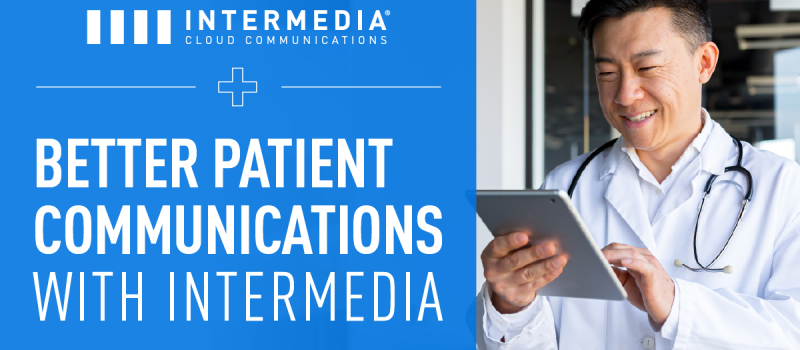Technology is evolving rapidly, and so is the way global industries utilize technological advancements to connect with their consumers. Healthcare is no exception. As the complexity of patient-provider interactions grows, providers are turning to artificial intelligence (AI) to help reduce communication gaps.
AI-powered healthcare systems enhance patient communication, streamline workflows, improve diagnostic support, and reduce administrative outcomes. Conversational AI is the latest advancement in healthcare technology that offers an innovative way to engage with patients.
Intermedia is a leader in secure, scalable communications tailored for the healthcare industry. We help providers navigate modern challenges, such as increasing costs, staff shortages, and a growing number of patients. Here, we discuss the role of conversational AI in healthcare, its benefits, and use cases so you can revolutionize the way you treat your patients.
What is Conversational AI in Healthcare?
Conversational AI is a specific type of AI that is capable of understanding and engaging in real-time conversation. Unlike traditional AI-powered chatbots, conversational AI uses natural language processing (NLP) and machine learning (ML) to assess the context and intent behind a human’s query, resulting in more human-like interactions. These processes enable chatbots, virtual assistants, and voice agents to respond naturally and mimic a human conversation instead of answering using preprogrammed responses.
These tools integrate with your backend system and help automate appointment scheduling, patient education, and symptom checking to make healthcare more efficient and accessible. Healthcare facilities can integrate conversational AI with electronic health records (EHR) and patient management systems. This integration helps reduce the administrative burden on staff while ensuring real-time availability for patients. This empowers patients to access essential help when they need it.
Key Benefits of Conversational AI for Healthcare Providers
The integration of conversational AI into healthcare brings many advantages for providers and their patients. These benefits include the following:
Enhanced Patient Engagement
Conversational AI systems provide support and information to patients 24/7. This access to web chat, SMS, voice call, and real-time translation for multilingual patient populations improves access to care, reduces wait times, and enhances the overall patient experience. Additionally, AI chatbots use human language to provide a personalized touch and can tailor interactions based on individual needs and preferences. This convenient communication allows for faster response times and increased patient satisfaction.
Operational Efficiency
Conversational AI can streamline administrative tasks to increase your operational efficiency. You can set up automated appointment scheduling, reminders, and cancellations. AI technology can also simplify the patient registration and check-in processes to make them faster and more efficient.
Furthermore, conversational AI can handle common patient inquiries, improve triage by analyzing patient information and symptoms, minimize errors, and help reduce incoming call volumes. By streamlining these routine tasks, conversational AI can reduce your administrative workload and free up your staff to handle high-value, in-person interactions.
Cost Reduction
With increased operational efficiency comes cost savings. Other ways conversational AI saves your healthcare facility money are through automated appointment reminders and follow-up messages. These messages significantly reduce no-show rates, allowing you to optimize your appointment schedule and resource allocation. Additionally, you can offer 24/7 information with AI assistants without needing to pay for a call center or an after-hours support center.
Better Patient Outcomes
AI-powered systems can improve patient outcomes through faster response rates. When patients are empowered to reach out with health questions, healthcare professionals can provide more proactive care, preventing a minor illness from becoming a major issue. These systems can also remind patients to take their medication and make it easy to request refills.
Conversational AI technology can also be used to remotely monitor patients’ conditions and track symptoms. They can also integrate with EHRs for a timely, accurate diagnosis and personalized treatment plan. Likewise, AI can use a patient’s record to provide them with tailored health information and education, empowering them to take an active role in their health.
Intermedia’s cloud-based communication tools support integration with conversational AI platforms for seamless engagement. Through integration, you can efficiently answer inbound calls, prioritize questions, and route callers to the proper resource. You can also interact with patients over HIPAA-compliant video visits and securely share emails and files while protecting patient health information.
Use Cases: Conversational AI in Action
Conversational AI has use cases across various industries, and it’s already having a significant impact in the healthcare sector. It’s being used to streamline processes, enhance user experiences, and support healthcare providers in this uncertain climate. Here are some key applications for conversational AI:
Primary Care Clinics
Primary care clinics can utilize conversational AI platforms for appointment scheduling, including rescheduling or canceling appointments and generating automated appointment reminders. You can also streamline the check-in process by using AI to ensure information is up to date, verify insurance, and screen symptoms. This not only makes your clinic more organized but ensures patients have a smooth experience.
Hospitals
Hospitals can leverage the power of AI agents to assess patient symptoms and guide them to the right care center, which can help reduce unnecessary emergency room visits. Additionally, AI bots can enhance post-discharge support through follow-up care instructions, monitoring, and personalized health information. You can also send automated messages to patients, including follow-ups and medication reminders.
Dental and Specialty Care
Dental and specialty care offices can utilize conversational AI to answer billing FAQs, verify insurance, and provide pre-visit instructions. Not only does automating these tasks speed up the check-in process, but it also helps reduce billing errors, accelerate claim processing, and minimize denials. Patients can also use conversational AI tools integrated into your website or app to reach out to a provider with questions.
Mental Health Services
24/7 access to emergency mental health care is often essential. Mental health clinicians can leverage conversational AI to reach new and existing patients. Conversational AI can automate the screening process through comprehensive intake forms and confidential symptom assessments. This allows you to match a new client with mental health support, such as the right therapist or provider whose expertise aligns with their needs.
Additionally, utilizing voice and text capabilities, you can check in with clients 24/7, whenever they need. Through chatbots, you can provide patients with coping strategies and emotional assistance while monitoring for emotional shifts. If the chatbot detects a dangerous change, it can suggest interventions or transfer the chat to a real human.
Considerations for Healthcare Organizations
Conversational AI has the potential to significantly transform the healthcare industry. However, there are several challenges that must be considered before it can be implemented effectively. As with any technology, you must consider the practical and ethical functionality before you adopt widespread usage.
In the healthcare industry, security and patient privacy are critical. As AI-powered chatbots become more prevalent, there is a risk that sensitive patient information could be shared without proper consent. Therefore, you need to make sure you have security measures in place to ensure you comply with the Health Insurance Portability and Accountability Act (HIPAA) standards.
In addition to patient confidentiality, you need to consider how well conversational AI can integrate with your existing EHR and practice management systems. Seamless integration is essential to ensure patient care isn’t disrupted. Additionally, you need to assess what functionalities you need to reach your patients. Do you need a flexible and scalable system that can utilize voice, chat, and SMS?
When you partner with Intermedia, you have access to our cloud-based communication solution. We specialize in HIPAA-compliant systems that improve your communication, enhance patient outcomes, and optimize your efficiency while keeping sensitive information secure. Our technology is scalable and can adapt to the needs of healthcare environments.
How Intermedia Supports Conversational AI in Healthcare
Intermedia’s secure voice, video, and messaging platform is built for healthcare workers. It integrates with AI platforms and your EHRs to support omnichannel patient interactions, improve patient outcomes, and manage patient communication efficiently. Our omnichannel contact center functionality enables patients to communicate with your practice in multiple ways, including recorded phone messages, text, and email.
With a 99.999% uptime, you can deliver a great virtual patient experience at any time. Our video conferencing capabilities support virtual patient visits, enable your staff to work remotely, and allow you to communicate with patients from an office phone, laptop, tablet, or mobile phone. Additionally, we use state-of-the-art security and encryption measures to ensure patients’ data remains secure and protected.
Our HIPAA-compliant software undergoes regular Service Organization Control (SOC) examinations to ensure the requirements for protected health information (PHI) are met. We also use a payment processing center that has passed the strict testing procedures set forth by the PCI Data Security Standards (PCI DSS). Furthermore, our easy-to-use interface has made us a trusted partner for healthcare IT leaders seeking a scalable communication infrastructure.
Ready to Modernize Patient Communication?
In today’s healthcare environment, there is an increasing emphasis on patient-centric care. Conversational AI acts as a pivotal touchpoint between patients and healthcare professionals. With this technology, patient care is improved, and patients can take an active role in their health journey.
Conversational AI enables patients to access test results and request visit notes. When patients have their information at their fingertips, they develop a sense of autonomy and can reach out to their providers 24/7. Additionally, AI bots can help with medication and chronic disease management. However, healthcare providers need a secure, integrated communications platform to support this technology.
Intermedia’s healthcare-optimized communication solution supports your conversational AI strategy with a secure cloud-based platform. Our solution provides you with a fully mobile and HIPAA-compliant email, calendar, and contacts platform that encrypts email and personal health information and blocks spam and viruses. It can fully integrate with your existing CRM, EHR, and phone systems.
Are you ready to modernize patient communications? Discover how our platform can help your organization work smarter, stay secure, and improve health outcomes with conversational AI solutions. Contact us today to schedule a demo of our future-proof healthcare services platform.
November 3, 2025
Explore other posts on these topics:



